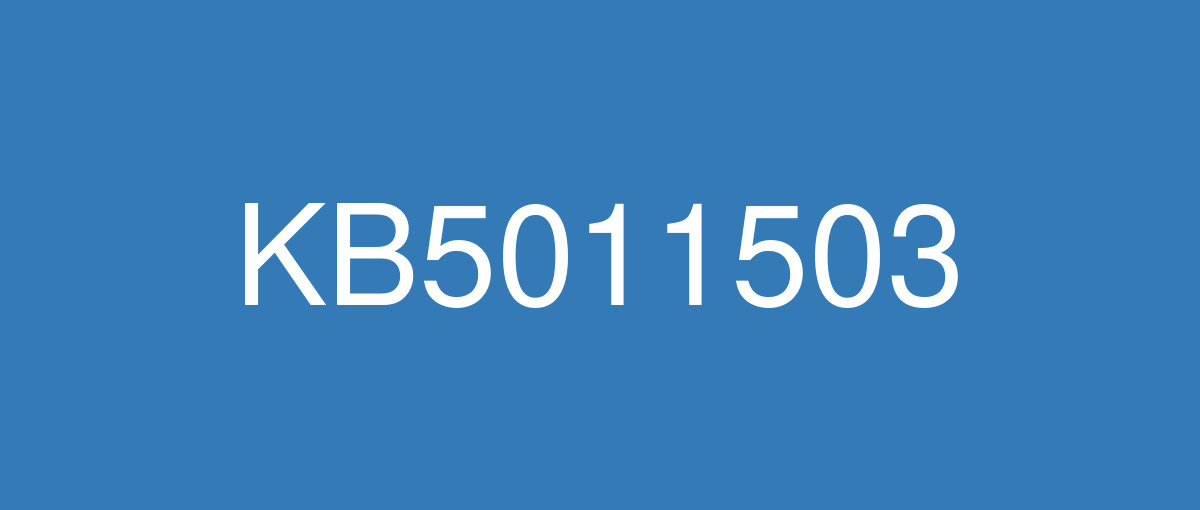KB5011503

詳細情報
| KB番号 | KB5011503 |
|---|---|
| リリース日 | 2022/03/08 |
| Windowsバージョン | Windows 10 1809 |
| ビルド番号 | 17763.2686 |
| URL | https://support.microsoft.com/en-us/help/5011503 |
| ダウンロード | Microsoft Update Catalog |
ハイライト
Updates security for your Windows operating system.
改良点
This update contains miscellaneous security improvements to internal OS functionality. No additional issues were documented for this release.
既知の不具合
After installing KB4493509, devices with some Asian language packs installed may receive the error, "0x800f0982 - PSFX_E_MATCHING_COMPONENT_NOT_FOUND." |
Note If reinstalling the language pack does not mitigate the issue, reset your PC as follows:
Microsoft is working on a resolution and will provide an update in an upcoming release. |
After installing KB5001342 or later, the Cluster Service might fail to start because a Cluster Network Driver is not found. | This issue occurs because of an update to the PnP class drivers used by this service. After about 20 minutes, you should be able to restart your device and not encounter this issue. |
After installing updates released January 11, 2022 or later, apps that use the Microsoft .NET Framework to acquire or set Active Directory Forest Trust Information might have issues. The apps might fail or close or you might receive an error from the app or Windows. You might also receive an access violation (0xc0000005) error. Note for developers Affected apps use the System.DirectoryServices API. | To resolve this issue manually, apply the out-of-band updates for the version of the .NET Framework used by the app. Note These out-of-band updates are not available from Windows Update and will not install automatically. To get the standalone package, search for the KB number for your version of Windows and .NET Framework in the Microsoft Update Catalog. You can manually import these updates into Windows Server Update Services (WSUS) and Microsoft Endpoint Configuration Manager. For WSUS instructions, see WSUS and the Catalog Site. For Configuration Manger instructions, see Import updates from the Microsoft Update Catalog. For instructions on how to install this update for your operating system, see the KB articles listed below:
|
After installing updates released January 25, 2022 (KB5009616) and later on affected versions of Windows Server that are running the DNS Server role, DNS stub zones might not load correctly. As a result, DNS name resolution might fail. A stub zone is a copy of a DNS zone that contains only resource records that identify the DNS servers for that zone. | This issue is addressed in KB5012647. |
After installing the Windows updates released January 11, 2022 or later Windows versions on an affected version of Windows, recovery discs (CD or DVD) created by using the Backup and Restore (Windows 7) app in Control Panel might be unable to start. Recovery discs that were created by using the Backup and Restore (Windows 7) app on devices which have installed Windows updates released before January 11, 2022 are not affected by this issue and should start as expected. Note No third-party backup or recovery apps are currently known to be affected by this issue | This issue is addressed in KB5014022. |
Windows server computers might log Event ID 40 in the System event log each time a Group Policy is updated or refreshed on a server or client. The error is found with the Description, ”The event logging service encountered an error when attempting to apply one or more policy settings.” This issue occurs after installing Windows updates released on or after January 11, 2022. The gpupdate and Group Policy Object (GPO) refresh tasks will trigger this error when they run (default run times for these tasks is every 90-120 minutes on member servers or 5 minutes on domain controllers). This issue occurs specifically after you configure any setting under Computer Configuration > Windows Components > Event Log Service > Security. Settings under Computer Configuration > Policies > WindowsSettings > Security Settings > Event Log do not trigger this error and can be used. IMPORTANT The errors described in this issue do not prevent Security log changes from being applied. | This issue is addressed in KB5014022. |